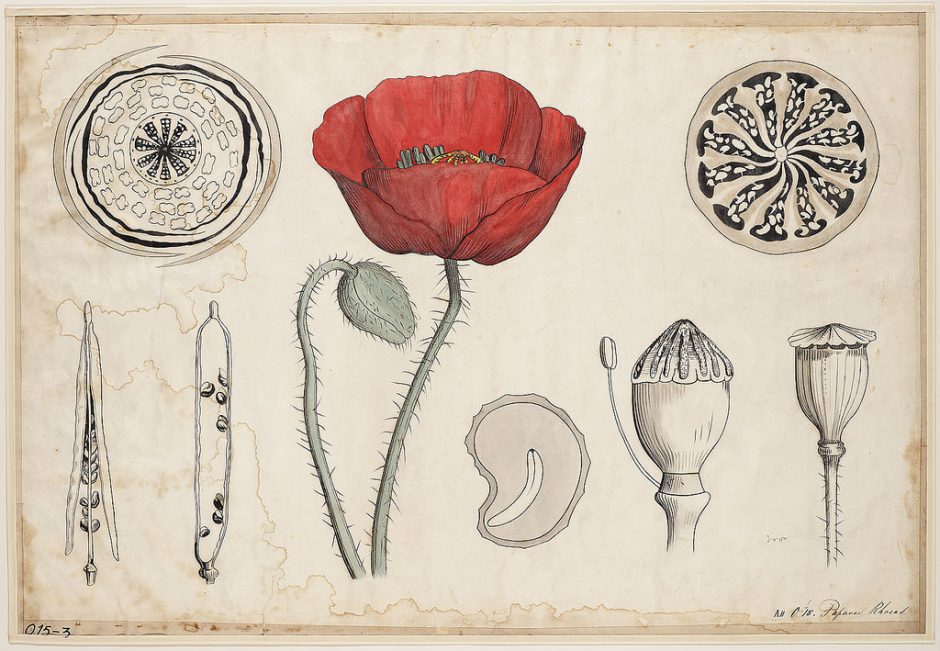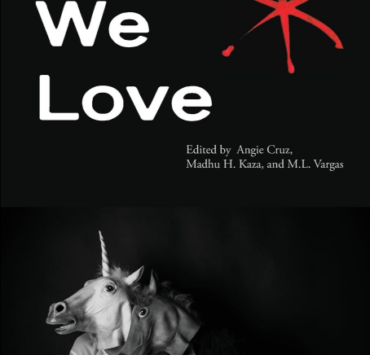
“Each time we remember something specific . . . that memory grows stronger. Like a path through the woods that grows more defined each time we walk it. If this is true though, what then does it mean to forget?” —Maribeth Fischer, The Life You’ve Longed For
I. Poppies Will Make Them Remember
During a walk through the woods on Memorial Day, I am thinking of poppies—their hot, maddening, unalleviated, scalded red—and the fallen soldiers they commemorate. I am thinking, too, of Moina Belle Michael, who in November 1918 experienced an idea as revelation: “In a high moment of white resolve I pledged to KEEP THE FAITH and always to wear a red poppy of Flanders Fields as a sign of remembrance and the emblem of ‘keeping the faith with all who died’.” Michael says she drew inspiration from the famous poem, written by Colonel John McCrae in homage to a fallen friend at the Second Battle of Ypres, which begins: “In Flanders fields the poppies blow / Between the crosses, row on row,” and ends “We shall not sleep, though poppies grow / In Flanders fields.”
But say the word poppy to anyone who might have read L. Frank Baum’s The Wonderful Wizard of Oz, or seen the film of the same name, and the association might conjure Dorothy and the Cowardly Lion overcome by the narcotic power of “a great meadow of poppies,” drugged by the wicked witch to make them forget—albeit temporarily—their mission. If the fantastic story of a girl and her companions—on a long walk through a mystical kingdom—had inspired the Remembrance Poppy, would it have had the same meaning?
If Moina were walking with me now, I might say that in spite of her “high moment of white resolve,” once you use a thing to symbolize something else, its original meaning often becomes unremembered. In fact, neither Flanders nor fields have ever crossed my mind when I bought one of those poppies sold outside grocery stores by veterans or members of the Ladies Auxiliary, the folding tables lain with literature and sometimes home-made baked goods, the women invariably in well- ironed, practical dresses, the men wearing hats on which are pinned medals or embroidered names attesting to their status as soldiers.
When I see those faux poppies, my thoughts do not turn to Belgium or the Great War, but to my neighbors who have seen battle and what they never say. First my nephew and his tour to Afghanistan in 2003 at the start of this mess in which we are currently embroiled. Then Jimmy Aronson, the son of my mother’s cousin, who did three tours in Vietnam, a nineteen-year old who tolerated my ten-year-old-girl crush. I think of my father’s dog tags, stowed in a case, and that he never said much about the war in Korea. And the scores of soldiers addicted to opiates because of pain resulting from severe injury, and how their addictions tell one story and conceal another. I want to forget the cruel irony that many of those men and women are still being wounded in Afghanistan, a country renowned for its opium trade.
II. It Takes a Lot to Laugh
Memorial Day was once called Decoration Day and originally honored the fallen soldiers of the Civil War; the holiday was celebrated on May 30th.
I know many military folk won’t like hearing this, but given that we’ve already twisted what Memorial Day commemorates, perhaps the holiday should honor anyone who has ever died for love—of country or turf, another citizen, an ideal, or just the freedom to walk in a street or drive on a road. That we should decorate the tombstones and gravesites and crime scenes of the oil slicked, the IED’d, the suicided, the domestically homicided, the overdosed, the succumbed to AIDS, the lost the battle with cancer, the stroked, the heart attacked, the shot down by gangs, the killed by police, the murdered in schools, the sniped on patrol, the massacred in schools and places of worship and dance clubs , the slashed and burned, the run over, run down, electrocuted, lethally injected, tortured to death, the assassinated. That we do not forget any of them, not the soldiers missing parts they fail to forget but cannot retrieve, nor the children who played in the love canal, nor the women brought to their knees.
III. “Then I’d comb my hair and throw away the poem . . . / this poem, in the trash”1
Late May and the woods are renewed with wing and song. Red-winged blackbirds chattering in the pond reeds. Cardinals in the maple tree. Pine boughs sighing and the echoed coo of mourning doves. The promise in the stretching light and warmth that the hummingbirds will arrive any day now. And then the feeling that all we’re really doing is hanging onto this beauty, as if for dear life itself.
Which is one reason, perhaps, that in spite of the luxury of the almost-summer birds and all this green and feathered beauty, I am queasy. I’m not sure anymore what it means to be a Jew, especially in the comfort of America, when the Palestinian, “expected to forget he’s human, is forced to accept the exclusion from human rights that will train him for freedom from forgetting the homeland.”2 To remember a homeland—to yearn for the quotidian practice of language and tradition—is, of course, the quintessential prerequisite for being an immigrant. But the Palestinian is a refugee in exile on the edge of home. Exile is a condition intrinsic to being Jewish, though Israeli Jews seem to have both forgotten and not forgotten this. When the birds forget how to migrate, we will be even more lost.
But another wound fractures my thoughts and threatens to widen into grief: the image of a two-and-a-half-foot stack of poems that my friend Robert told me he left out with the trash. He is a tall man, and I picture him tilting his head to listen to the garbage truck as it rattled down the street, then peeking out the windows to watch as the “sanitation engineers” removed his stack of verse. Wondering then, wondering still, if that disposal was the right thing to do.
What would make a man, one who cherishes words, consign his own to a landfill? To unsound all those syllables, unbuild all those stanzas, unwrite all that language, unstitch all those hours: what kind of courage is that, apart from being a valor without measure, that goes unrecognized on Memorial Day?
Four years later, Robert sends me a photograph of his best friend. In the picture, Sam is about nineteen. He is sitting on a foot locker, his head resting against his hand, his gaze direct, expression seductive. He is holding an M16 with a peace symbol painted on the weapon’s butt. The light is a faded gold that is typical of old photographs. “I call it Born in the USA,” Robert tells me. Sam has just committed suicide.
IV. “The law of the past cannot be eluded”3
And what, really, are we supposed to remember on this day? The price of war?4 The unsolsticed, faux beginning of summer, when ladies may once again on their white shoes and jackets? Hamburgers and hot dogs and the national diabetes epidemic? That our appetite for grills, dandelionless emerald-carpet lawns, and twenty-four-hour Walmarts is backstory to the Deepwater Horizon disaster in the Gulf of Mexico, an event I can barely stand to contemplate years later, because when I do, the picture of an oil-drenched brown pelican5—which I simply cannot unsee—frustrates any attempt at compassion I may have for the eleven workers who died in the explosion on April 20, 2010.
One image bleeds into another: the blobs of oil—“like melted chocolate”—washed ashore at Grand Isle, Louisiana, the setting of Kate Chopin’s novella The Awakening (whose title should be considered a prescient announcement of what we must do now to prevent such disasters from ever happening again). I see, again, images of those petroleum-soaked otters of Prince William Sound in the aftermath of the drunken-boat horror of the Exxon Valdez. Over twenty-five years later—a generation, in human terms—if you dig on those Alaskan beaches, you hit oil. The body does not forget.
V. “…to reconcile / the people and the stones.”6
Robert, whose poems are now disintegrating in a landfill, once made a pilgrimage to the home of William Carlos Williams, only to discover that the blue rock in the garden (where the poet sat and contemplated things) had been demolished, the stone put out with other “remodeling” debris. Robert furtively “rescued” a piece of that broken rock. “I wish I had a garden to put it in,” he told me.
What stones shall we set in the gardens we have not yet planted on this Memorial Day? One for the heroes of the burning towers? One for the suicide bomber? One for the child lost, another for the amputee? One for the black life that mattered, one for the cop working his beat? One for the student or teacher or club goer?
In his dispatch from Beirut during the August 1982 siege, the poet Mahmoud Darwish writes, “Anti-forgetfulness wars; anti-oblivion stones. No one wants to forget. More accurately, no one wants to be forgotten.”7
VI. Those Who No Longer Remember Who You Are
How might we reconcile ourselves with the too-heavy-to-move stones of our Alzheimered memory?
On this national day of should-be remembering in a country obsessed with forgetting the genocide on which it is founded, the lessons of history, and even age itself, let us now remember the elders who waste away in places we once called nursing homes and which we now refer to as Assisted Living. Think of it: To live with assistance in a nation whose citizens value so firmly their independence. Or, at least, their interdependence. One such resident of these newfangled homes was my father’s sixth and last wife, Mary, one of thirteen children who grew up speaking Yiddish in the Bronx. Eleven daughters and two sons. When their father died, all the girls in the family worked to put the two boys through school. Mary is the last one alive; widowed twice after my father died, she has endured the loss of everyone who is truly familiar to her. “I am lonesome,” she tells me as we sit in her rooms at the assisted- living facility run by Marriott.
On this side of the complex lingers a faint smell of antiseptic detergents, the worn skin and bones and flesh of the aging, and the recently sprayed scent of Febreze. We mask the odors that make memory. We box up our old folks in buildings run by corporations. All recollection erased.
When we go to dinner, Mary tells me about the activities at the facility: musical acts (what lurid covers of “On the Boardwalk” last played here? I wonder) and crocheting, visits to the beauty parlor, occasional outings to the movies. She says that she doesn’t tell anyone her true age (ninety-four) because she’s older than most of the residents and is in excellent health (still cunningly beautiful are her legs, which, along with those of her eleven sisters, were famous—“those Schulman legs,” people called them). She has no dementia and no diseases. Just a few aches and pains, she says. Unlike the majority who live here. But, I think, all of them are in the process of departing, with scant recording of their lives and memories, without so much as a question as to what they recall about wars or the soldiers in their families, or what fruit was available in the market when they were children or how the loneliness of being forgotten has really affected them.
VII. Go Shopping
And don’t forget the Memorial Day Mattress Event. The Buy-One-Get- One-Free Offer. The Super Sales. The 72% Off Deal. Just look for the giant American flag flapping outside the store or the mall. And if no star-spangled banner waves above these depositories of our disposable income, or if you’ve misplaced one of the many circulars8 delivered through the postal service and you’re in a tizzy about where to find a nearby sale, there’s a website that can help. Shop till you drop and just forget about what it once meant to remember.
VIII. Hit the Road, Jack
On Memorial Day weekend 2010, just after the Deepwater Horizon disaster in the Gulf, an estimated 32.1 million Americans took to the road; hundreds died and more were injured; close to half of the holiday fatalities on U.S. highways involve drivers who consume alcohol. Experts at the Automobile Association of America said they could not predict what effect the BP oil spill would have on tourism that weekend, but everyone in the Gulf area pretty much expected that folks wouldn’t flock to their oil-slicked shores.
As of this writing in December 2016:
- Over 6,800 U.S. soldiers and over 6,900 contractors have died in Iraq and Afghanistan (the numbers of contractors from other countries is not included).9
- According to the Watson Institute of International & Public Affairs at Brown University, approximately 210,000 civilians have died in Iraq, Afghanistan, and Pakistan as a direct result of the wars. The Institute reports that coalition partners have died in large numbers: approximately 43,000 uniformed Afghans, Iraqis, and other allies have died as of May 2014.
- Some estimate that 1,000,000 soldiers have sustained injury
- According to National Institutes of Health researchers, some 320,000 veterans from these wars have sustained brain injuries10
- 22 veterans commit suicide every day11
Between the point of my writing this and the point of you reading it, more soldiers will be wounded or die. The shortest distance between two events is as large as a death, as small as a metal shard disrupting a person’s brain, as far away as Iraq or Afghanistan, places most Americans cannot identify on a map.
IX. What Is Not Forgotten
Walking in the woods, it is hard to forget that squirrels remember where they hide each and every one of the hundreds of acorns and nuts they bury.12
Birds remember the twists and turns of thousands of miles of flight paths to and from nesting sites.13 Walruses depend on their whiskers to identify members of their herds; rhinoceroses make urine mounds to communicate with one another; elephants memorialize their dead by passing the tusks of the departed. Dogs recall things that frighten them.14 Cats pretend to remember nothing, though they are very practiced at the ritual of following the sun as it moves through the house.
X. One Memorial Day (May 2010)
Early morning light saturates the woods where I walk, attempting to remember something important that someone said to me, or whether I told a particular story to a particular person. I rummage around my mind for names of people I went to school with, streets I once lived on, things I did that seemed inconsequential but weren’t. I try to recall a dream. In the spaces where those memories once resided, I leave imaginary pebbles, memorials to the unremembered trivia of my life.
I try to envision—to recall in the present, as it were—what it must be like for a woman in Afghanistan to not only survive without education or rights but to live under a burqa, to have her entire self hidden to everyone except other women, her husband, and her immediate family, how hot it must be under that stifling mandate, how anonymous to the point of breaking, how tiresome.
XI. “Do you think I could walk pleasantly and well-suited toward annihilation?”15
To complete an average day without weeping for hours on end, I must consciously forget that which wounds the psyche. For example, I do not want to remember that, for a time following the Deepwater Horizon disaster,16 an amount of oil equivalent to the Exxon Valdez disaster continued to flow into the Gulf of Mexico every six to twelve days.17 I have no desire to recall the predictions that mitigation of this damage will require five generations to pass.18 By then, who will remember the names Exxon or BP or Valdez?
And then the news that we may never leave Afghanistan because major deposits of lithium—worth a trillion U.S. dollars—were rediscovered there.19
Like any human living in these times, I would protect myself by not dwelling on the fallen-in-war, the slaughtered-by-the-error-of- human-hubris, the crushed-in-cars, the extinguished-by-murder. Yet these dead linger on—preserved in minute-of-silence newscasts on PBS, in the CNN or Fox News crawls, in obituaries, on radio shows, through headlines—and in these constant parades of names and reports, those who have perished simultaneously vanish, dying a second time, forgotten again.
XII. Forgotten Elegy: It Takes a Train to Cry
No train stops at Gettysburg, where I once lived, though there are railroad tracks and a train station. Which means that to claim the bodies of Sergeant Jonathan E. McColley and first Lieutenant Robert A. Seidel, III (two young men from Adams County, Pennsylvania, who died in Iraq), their families will have to travel somewhere else. There will be no kin or neighbors assembled along the railroad tracks as the train pulls in bearing the bodies of the fallen because no train comes here anymore, to this town where the Civil War turned and where trains once stopped. No flag-draped caskets will be carried from the station to the funeral home.
Let us now praise these not-famous young men, whose faces are broadcast on television and computer screens, whose deaths are only virtual to those of us who did not know them, whose brief imprints in homes and lives and towns and places beyond our imagination were too brief. Let us now observe a silence for all the other men and women who have perished thusly or been transformed beyond recognition. Let us now walk in the shoes of the other—be it the Palestinian if you are a Jew, or a secretary in the World Trade Center if you are a jihadist—and listen to our enemies. Let us now remember, every time we start a car, the disaster in the Gulf of Mexico, and let us also recall, when we proclaim cleanliness next to Godliness, each and every creature, from the tiniest shrimp to the burliest man, inhabiting or working those petroleum- poisoned waters. Let us now unearth the words in the landfills, set the rock in the gardens, and assist the living to tell their stories.
Lest these truths, which we may have forgotten to hold as self-evident, be unremembered.
1. Mahmoud Darwish, “Remainder of a Life” (trans. by Fady Joudah).
2. Mahmoud Darwish, Memory for Forgetfulness.
3. Walt Whitman, Leaves of Grass (“To Think of Time”).
4. According to a study in 2013, the cost of the wars in Iraq and Afghanistan will total four to six trillion dollars. “Every hour taxpayers in the United States are paying $4 million for the cost of war in Afghanistan [and] $117,035 for the cost of war in Iraq.” See: http://bit.ly/2cUtj7u
5. A bird that was removed from the Endangered Species List only six months before the Deepwater Horizon disaster.
6. William Carlos Williams, “A Sort of a Song.”
7. From Memory for Forgetfulness, p. 15.
8. Read: the never ending stream of junk mail whose production, distribution, and disposal (or recycling, if everyone were to recycle them), consumes another deepwater well’s worth of petroleum.
9. Source: http://antiwar.com/casualties/
10. See: http://www.ncbi.nlm.nih.gov/pmc/articles/PMC4255273/; see also the work of public health researcher Rachel Chase, who discovered an alarming rate of undiagnosed traumatic brain injury among veterans from the wars in Iraq and Afghanistan: http://magazine.jhsph.edu/2015/spring/features/invisible- wounds/
11. This particular number has a context. The source of this is comes from: http://bit.ly/1mbwVuQ; see also: http://lat.ms/17N0fqk; http://wapo. st/1M4BpBL
12. According to Dr. Pierre Lavenex at University of California at Berkley, gray squirrels, in retrieving each nut from its singular burial spot, “use information from the environment, such as the relative position of trees and buildings, and they triangulate, relying on the angles and distances between these distant landmarks and their caches” (cited in Animals in Translation, by Temple Grandin).
13. The migratory route for Arctic terns is 18,000 miles round trip.
14. But as Temple Grandin writes, “Both animals and people can ‘get over’ a learned fear. But getting over a fear isn’t the same as forgetting a fear. Extinction [a term used by behaviorists to describe the phenomenon of extinguishing a particular response to a stimulus] isn’t forgetting; it’s new learning that contradicts old learning.”
15. Walt Whitman, Leaves of Grass (“To Think of Time”).
16. 10.8 million gallons. Or one gallon a day for approximately 29,589 years.
17. The oil that that continues to gush into the Gulf may well cause the kind of food-chain collapse inherent in an extinction event. Unfortunately, though, we are not talking about the type of extinction that animal behaviorists describe; the human animal has not yet alleviated its fear of living without petroleum.
18. Five generations means that if you have children, maybe your great-great- great grandchildren will be able to see clean water in the Gulf of Mexico. Which means you cannot take your children there or your grandchildren or even your great-grandchildren. But maybe you think more like George W. Bush, who, when asked by journalist Bob Woodward how he envisioned the future, responded, “Well we won’t be here to see it.”
19. The Russians knew of these mineral deposits. The Afghans hid the maps that detail where they were located. Which begs the question of what intelligence really is, given that the American intelligence community surely was aware of the maps (and thus the deposits). Rediscovery is an odd use of tense and time, especially given the ancient country we’re talking about here.
Image Credits: Public Domain

Kim Dana Kupperman is the author of the essay collection, I Just Lately Started Buying Wings: Missives from the Other Side of Silence, and, forthcoming in November 2016, The Last of Her: A Forensic Memoir. She is the founding editor of Welcome Table Press, a nonprofit independent press devoted to publishing and celebrating the essay. She is a guest faculty member at West Virginia Wesleyan's low-residency MFA Program and teaches in Johns Hopkins University’s MA in Writing Program.







